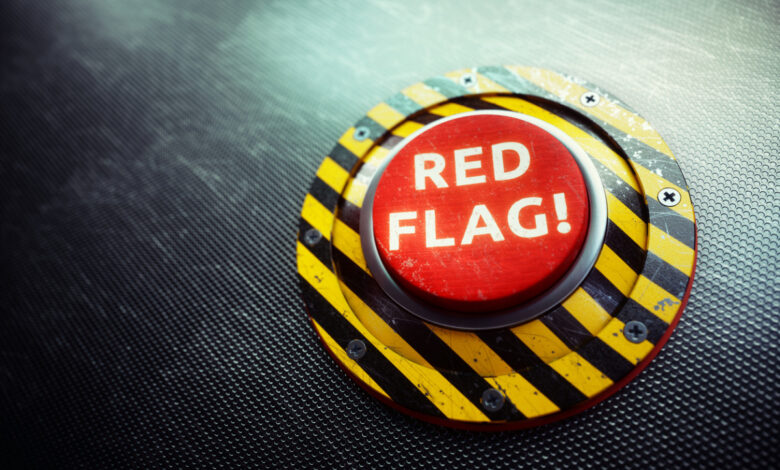Identifying Relationship Red Flags: What to Watch Out For

Relationships can be exciting, fulfilling, and life-changing, but they can also be complicated. As you get to know someone better, it’s crucial to remain aware of the signs that could indicate an unhealthy or toxic relationship. Recognizing relationship red flags early on can help you avoid emotional distress, protect your well-being, and ensure that your relationship is built on a foundation of mutual respect and care.
In this article, we’ll explore the most common relationship red flags that you should watch out for and tips on how to address them. By being aware of these warning signs, you can make more informed decisions about your relationship and protect yourself from harm.
Controlling Behavior
One of the most significant relationship red flags is controlling behavior. If your partner consistently tries to dictate what you wear, who you spend time with, or where you go, it’s a major warning sign.
- What it looks like: A controlling partner may Relationship red flags question your every move, try to isolate you from friends and family, or make you feel guilty for spending time away from them.
- Why it’s a red flag: This type of behavior can be manipulative and can lead to emotional and physical abuse. Healthy relationships v Relationship red flags involve mutual trust and respect for each other’s independence.
- What to do about it: If you feel controlled, it’s important to set clear boundaries and communicate your feelings. If the behavior continues or escalates, it may be necessary to seek support from a trusted friend, family member, or professional Relationship red flags .
Tip for relationship red flags: Always prioritize your independence and mental well-being in a relationship.
Dishonesty and Secrecy
A foundation of trust is essential in any relationship. If your partner is frequently dishonest, hides things from you, or refuses to share important information, this can signal major problems down the road.
- What it looks like: Lying about past relationships, financial issues, or personal habits. Keeping secrets or hiding their phone, social media accounts, or whereabouts.
- Why it’s a red flag: Dishonesty undermines trust and breeds suspicion. A healthy relationship is based on honesty and transparency, and when those elements are missing, it’s difficult to build a meaningful connection.
- What to do about it: Talk to your partner openly about your concerns. If your partner refuses to be honest with you, it may be time to reassess the relationship.
Tip for relationship red flags: Trust is key in any relationship. If you notice dishonesty, it’s essential to address it directly and decide if the relationship is worth continuing.
Frequent Criticism and Belittling
Everyone has moments of self-doubt, but consistent criticism or belittling can have long-lasting effects on your self-esteem. A partner who regularly puts you down is displaying a significant relationship red flag.
- What it looks like: Your partner may make negative comments about your appearance, intelligence, abilities, or personal choices. They might belittle your achievements or criticize you for things you can’t control.
- Why it’s a red flag: This behavior can be emotionally damaging and lead to feelings of insecurity and low self-worth. Healthy relationships should lift each other up, not tear each other down.
- What to do about it: Communicate how their comments make you feel, and ask for respect. If the behavior doesn’t change, you may need to reevaluate the relationship or seek support from a counselor.
Tip for relationship red flags: Pay attention to how your partner makes you feel about yourself. A relationship should boost your confidence, not diminish it.
Also Read: Essential First Date Tips: Make a Great Impression and Have Fun

Lack of Respect for Boundaries
Everyone has personal boundaries in relationships, whether they’re emotional, physical, or mental. A partner who doesn’t respect your boundaries can create significant issues in the relationship.
- What it looks like: Your partner may push you into uncomfortable situations, ignore your requests, or pressure you to do things you’re not ready for. They might disregard your personal space or emotional needs.
- Why it’s a red flag: Respect for boundaries is fundamental for healthy relationships. When boundaries are violated, it shows a lack of respect for your autonomy and individuality.
- What to do about it: Set clear boundaries and communicate your needs openly. If your partner disregards or violates your boundaries, it’s essential to address it right away. If it continues, it could be a sign of emotional or physical abuse.
Tip for relationship red flags: Always communicate your boundaries and stand firm in maintaining them. If your partner doesn’t respect them, reconsider the relationship.
Jealousy and Possessiveness
While a little jealousy is common in relationships, excessive jealousy and possessiveness can be major red flags. This behavior often stems from insecurity or control issues and can become toxic over time.
- What it looks like: Your partner constantly accuses you of flirting or being unfaithful, even without evidence. They may monitor your movements, check your phone or social media accounts, and try to control who you interact with.
- Why it’s a red flag: Excessive jealousy is often rooted in insecurity, and it can lead to controlling behavior or emotional abuse. It’s also a sign that your partner doesn’t trust you, which can erode the foundation of the relationship.
- What to do about it: Have a conversation with your partner about their feelings and explain the importance of trust and independence. If the jealousy doesn’t subside, it may be time to consider ending the relationship.
Tip for relationship red flags: Jealousy and possessiveness are often signs of deeper insecurity. Trust and open communication are key to overcoming these issues.
Disrespect Toward Others
How your partner treats other people, especially those who they feel have less power or influence, can be a huge indicator of their character. A relationship red flag arises when your partner displays disrespectful behavior toward others.
- What it looks like: Rudeness to waitstaff, disrespect for family members or friends, or treating strangers poorly. This behavior may include mocking or belittling others and demonstrating a lack of empathy.
- Why it’s a red flag: If your partner can’t show respect or kindness to others, it’s likely that they won’t treat you with the respect you deserve in the long run. This can lead to patterns of abusive behavior.
- What to do about it: If you notice your partner being rude or disrespectful, have a conversation about it. Explain why this behavior is unacceptable and see if they make an effort to change. If the behavior continues, you may need to reevaluate your relationship.
Tip for relationship red flags: Pay attention to how your partner treats others. Respect and kindness toward everyone are essential in a healthy relationship.
Conclusion: Trust Your Instincts
Recognizing relationship red flags is essential to Relationship red flags ensuring that your relationship is healthy and fulfilling. If you notice any of these warning signs, trust your instincts and take them seriously. Address issues early on, communicate openly with your partner, and remember that your well-being should always come first.
In some cases, relationships may be salvageable through counseling and communication, but if the red flags continue or escalate, it may be necessary to walk away to protect yourself.





One Comment